John and Matthew are watching every single live-action film starring Meryl Streep.
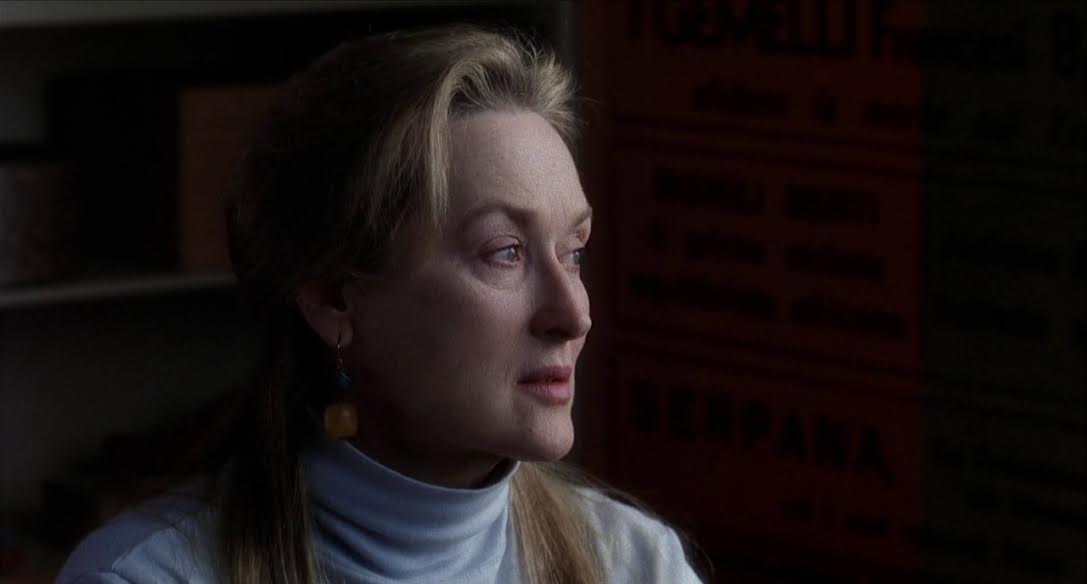
#29 —Clarissa Vaughan, a higher-up and hostess of the New York literary scene attempting to throw a party for her dying friend.
MATTHEW: Even before Meryl Streep stepped before the cameras as the unraveling hostess Clarissa Vaughan on Stephen Daldry’s The Hours, the actress already possessed a role in Michael Cunningham’s Pulitzer-winning, tripartite meditation on love, loss, and Virginia Woolf. Early on in Cunningham’s 1999 novel, Clarissa, while shopping for flower, catches sight of a movie star who may be Streep or Vanessa Redgrave or, much less excitingly for Clarissa, Susan Sarandon emerging from her trailer with an “aura of regal assurance.” Streep’s ephemeral appearance in what will prove to be one of the most pivotal days of Clarissa’s life signifies, quite literally, the sublime; her quasi-cameo is a perfect encapsulation of one of those chance, indirect encounters with a famous face that we use, with varying levels of embarrassment, to distract us from the mundanities of our daily routine, a glimpse of the extraordinary amid the everyday. That Streep the Star, who was gifted a copy of "The Hours" by Redgrave’s late daughter Natasha Richardson, is removed from Daldry’s film speaks to the many, many excisions that occur within any page-to-screen transfer, but it also informs us that Streep’s cinematized Clarissa Vaughan is simply beyond distraction...
I will always appreciate Daldry’s version as a rare if principally partitioned meeting of three extraordinary screen stars...
Each of them are tasked with entering the soul of a woman who is struggling in her search for a reason to carry on with life and its heaviness: Streep’s Clarissa; Julianne Moore’s Laura Brown, a discontented housewife in 1951 Los Angeles; and Nicole Kidman’s Virginia Woolf, trying her best to keep her demons at bay while brainstorming a new work in the English suburb of Richmond circa 1923.
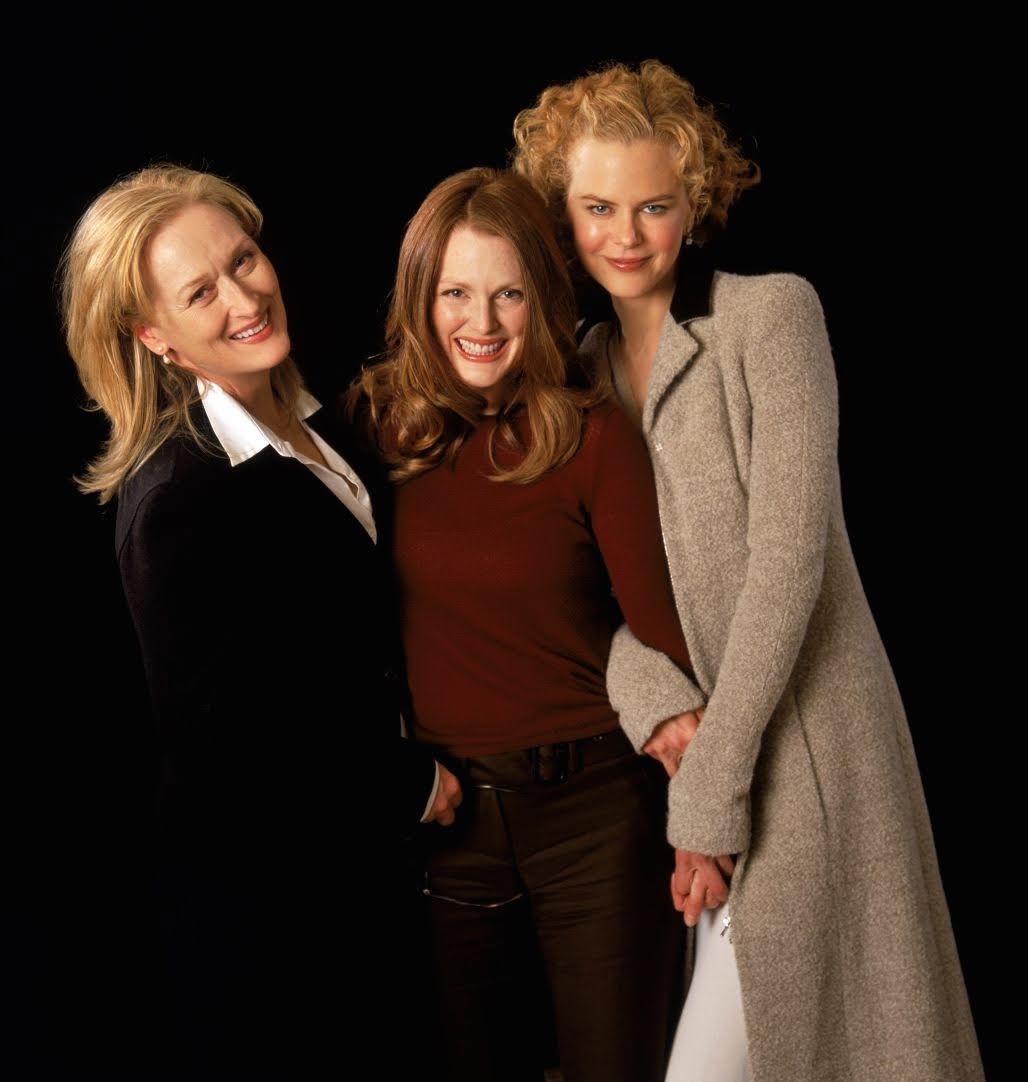
In openly wrestling with Woolf’s seminal 1925 novel "Mrs. Dalloway," Cunningham and adapter David Hare present Clarissa, a bourgeois Manhattan publisher-editor putting the final touches on a celebration for her friend Richard, an acclaimed poet dying of AIDS, as a modern-day avatar of Woolf’s titular society maven. Yet although Clarissa sits beside Laura and Virginia at the center of The Hours, she is marked by a fascinating sadness that somehow sets her apart from her co-protagonists in that its foundation is untraceable, whereas Virginia’s mental illness and Laura’s middle-class inertia are depicted, in some measure, as the root causes of their own unrest. With all of her inexplicable and frequently internalized anguish, Clarissa strikes me as the character in Cunningham’s source text that would prove the most unplayable for any actor, but Streep, who was brought to the project as a seemingly impossible casting coup by producer Scott Rudin, is the performer who, to my mind, comes closest to fully embodying the unbearable, self-confronting contemplation that is the chosen métier of The Hours in both forms.
We first meet Clarissa on the morning of Richard’s party, asleep in the bedroom of her imposing West Village apartment as Sally (Allison Janney), her partner of a decade, creeps into bed after clandestinely returning just minutes before. When Clarissa opens her eyes not long after, the first thing we see is the exhaustion that seems to bleed from her eyes. It’s there, too, in the weary stare that Streep sends out as she peers at herself in the bathroom mirror, a look that appears to ask if she really has the strength to commit to this day. But she does, and it isn’t long before Clarissa is traversing the wintry streets of the West Village, en route to the flower shop, a la Mrs. Dalloway, to get the flowers herself. What remains most masterful about Streep’s work is that it burrows deep within the gray spaces of Clarissa’s psychology, refusing to resolve any of the trivial but truth-telling encounters that define her day.
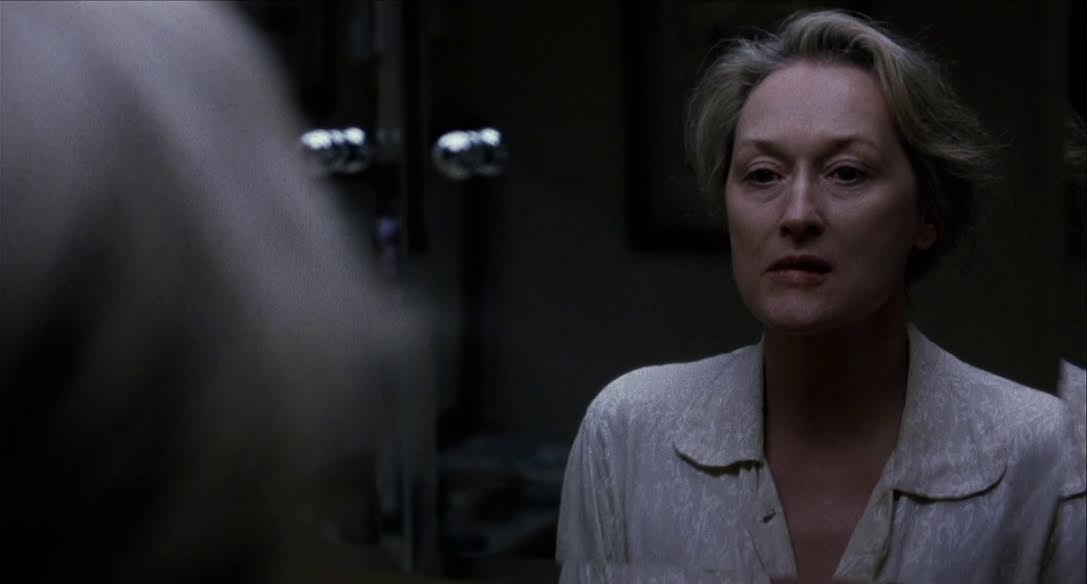
Take Clarissa’s interaction with the florist (played with delicious mischief-making by preeminent Woolf interpreter Eileen Atkins), in which the latter makes unveiled inquiries into whether or not the central character in Richard’s badly-received novel is, in fact, Clarissa herself. “He changes things,” Clarissa gently counters. “And then he makes them his own... I don’t mean in a bad way.” It’s in that last phrase that Streep shows us the two predominant sides of Clarissa: the fiercely loyal friend who is more precious about Richard’s work than, we will soon find out, even he is, but also the nervous self-preserver who knows the book is about her and that this character, an incorrigible party-thrower prone to frivolous pursuits, is perhaps more exposing than she would like.
When Clarissa next goes to Richard’s apartment to prepare him for tonight’s plans, Streep’s own performance is nearly threatened by a crucial scene partner. Harris’ grumbling, one-note interpretation of this profoundly haunted artist rings false but Streep doesn’t need his help to concoct a multicolored panoply of reactions that fleshes out a complete history of Clarissa and Richard’s relationship in all its passive-aggressive pugnacity and loving reassurance. Streep ultimately requires only Hare’s words to show us that Richard is at once a companion and life source to Clarissa, and some of the precisest moments in Streep’s entire performance arrive when one of Richard’s cutting remarks forces Clarissa to privately pause, re-calibrate, and consider her position before quickly rousing herself out of these spells of delayed self-inquiry, stopping just short of taking full stock of the life she leads. Why don’t you take us through the next stages of Clarissa’s crisis, which begets some of the most shattering and awe-inspiring scenes of Streep’s 21st century career?
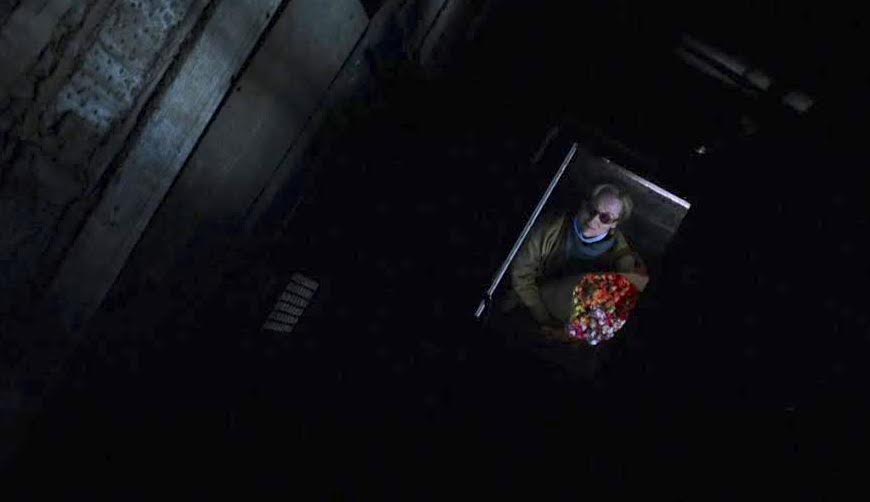
JOHN: Sure, but first let’s ride the elevator. After Richard bemoans the party Clarissa is throwing for him, forcing her to endure such loaded questions as, “Would you be angry if I died?” and recasting her commitment to him as a pathetic character flaw, Streep exits, puts her sunglasses on, and backs up against the elevator wall. Although Streep certainly matches Harris’ anger and fully absorbs his criticisms in their scene, it isn’t until she is finally alone in the elevator that she lets down her guard to show how deeply Richard’s comments have rankled her. This image of Streep, stone faced and exhausted, silent, her eyes shielded and her body upright, reminded me of a description from Woolf’s 1927 masterpiece "To The Lighthouse," in which her heroine Mrs. Ramsay is lamenting all the performativity involved in simply going about her day, yearning instead for the solemnity and solitude of her own company:
“For now she need not think of anybody. She could be herself, by herself. And that was what now she often felt the need of — to think; well not even to think. To be silent; to be alone. All the being and the doing, expansive, glittering, vocal, evaporated; and one shrunk, with a sense of solemnity, to being oneself, a wedge-shaped core of darkness, something invisible to others... and this self having shed its attachments was free for the strangest adventures.”
Streep’s Clarissa never arrives at the latter end of Woolf’s description, as much as her attachments may try to shed themselves of her, but she certainly carves out moments of solitude in which to contemplate the “strange mood” the day has put her in.
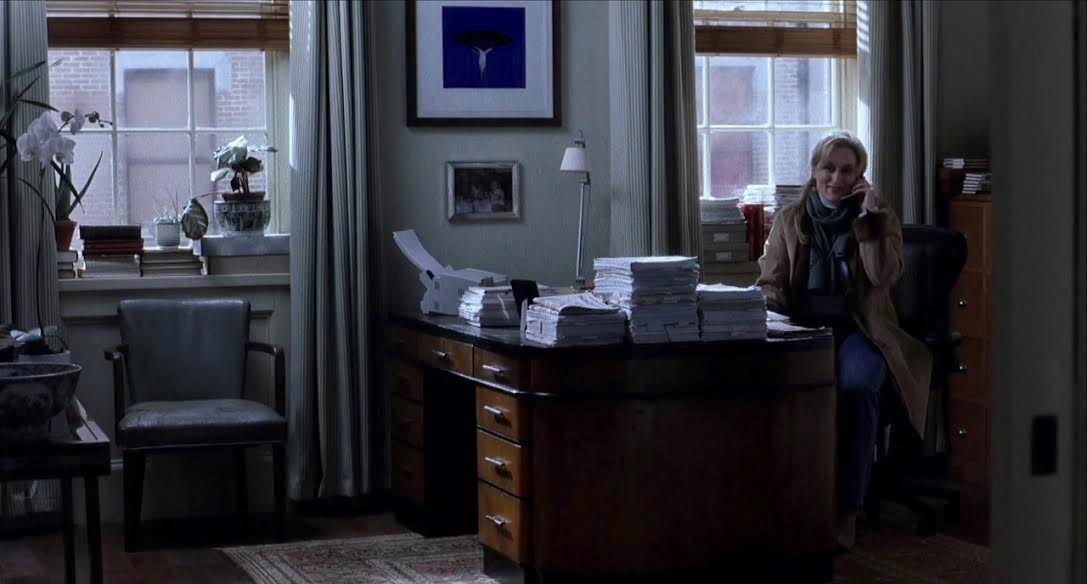
Another perfect tableau: following this battle with Richard, Clarissa sits in her office, dwarfed by piles of books and manuscripts, and looks forlornly out the window, desperate for some solace. When Sally tries to make conversation with Clarissa, she can’t even get up, and instead shouts across the apartment, answering Sally’s questions in clipped, terse responses. Submerged in troubling thoughts that she can barely string into sentences, Streep creates a rich portrait of a woman bogged down in the muddy waters of her psyche with no anchor and no rescue. Betrayed by Richard, unfazed by Sally, Clarissa is utterly alone, emphasized by the shots of her cordoned off in her office. The very fabric of her life is falling apart, and on a day where everything must come perfectly and publicly together.
Streep’s performance hits its absolute peak upon the arrival of a long-lost friend, Richard’s ex-partner Louis (Jeff Daniels), who is both an estranged and a familiar enough presence for Clarissa to confess her despair. Clarissa is blasting opera and preparing “the crab thing” when the doorbell rings and already we sense that this woman is herself a pot on the stove about to boil over. Streep’s nervous energy gets channeled through her cooking, cracking, and separating eggs to the frenetic rhythm of Philip Glass’ score. When the two eventually broach the topic of Richard and his book, Streep doesn’t even bother trying to contain her uneasy mental state. Louis remarks that Clarissa is courageous, to dare to go visit Wellfleet, the site of their summer of love, “to face the fact that we have lost those feelings forever.” Streep makes clear, however, that Clarissa cannot face the fact of her own feelings. She paces around the room. “I’m sorry, I seem to be in some strange sort of mood. I seem to be unraveling,” she admits.
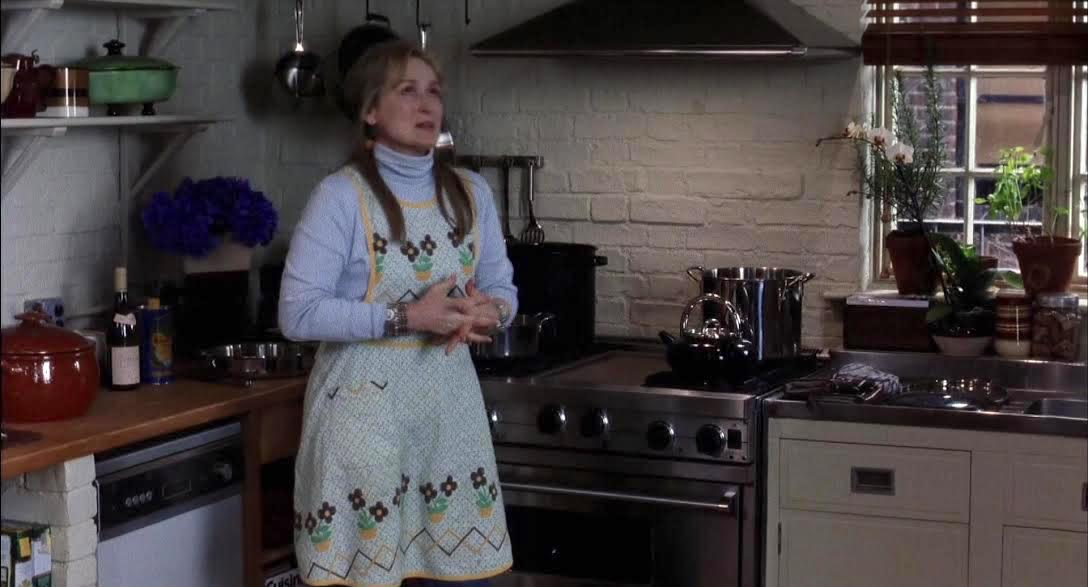
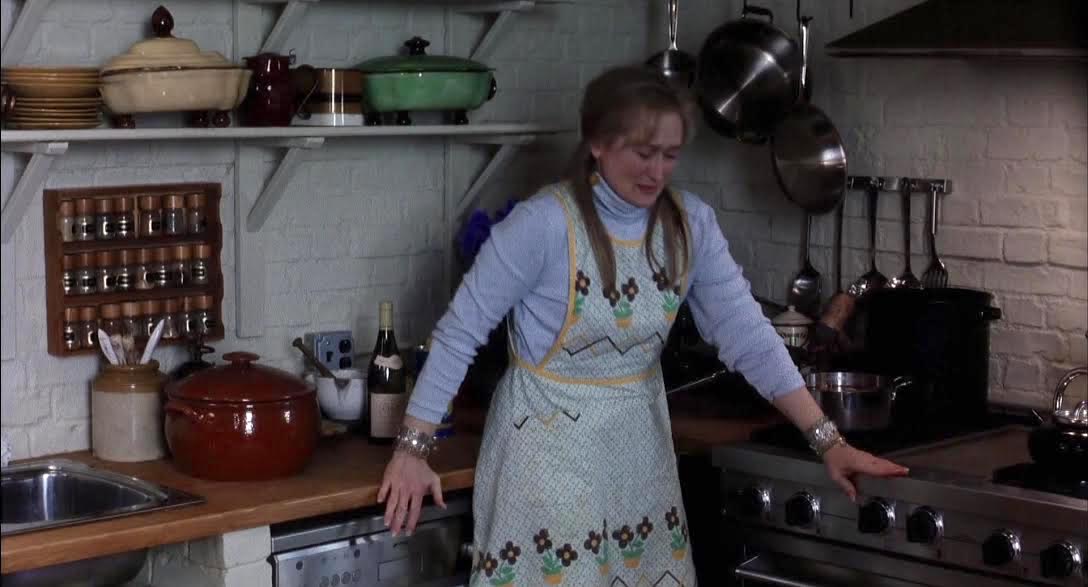
There is nothing misplaced or extraneous in Streep’s performance here; every gesture, look, and movement is completely in service of Clarissa’s breakdown, as opposed to an opportunity for the actress to writhe or sob for the sake of going big. Clarissa resents how Richard has made her feel trivial, but Streep doesn’t render Clarissa’s crisis as trivial in the slightest. Instead, Streep’s performance feels genuinely frightening and unmanageable, steadying herself on her kitchen counter and sinking to the ground in tears, under assault by her sadness.
MATTHEW: Just closing my eyes right now, I can envision with near-perfect accuracy the way Streep’s body hunches forward in this scene, knees buckling, hands urgently clutching the countertop that is her only source of support. It’s almost as if Clarissa is physically repelling the impending breakthrough, so much so that the very line “I seem to be unraveling” feels even blunter and more superfluous than it appears on the page, forcing Streep to verbalize what her body is already viscerally communicating. This scene is a poignant and perfect crystallization of Streep’s objective, which is to expose the fissures in one woman’s confidence, her overriding sense of self.
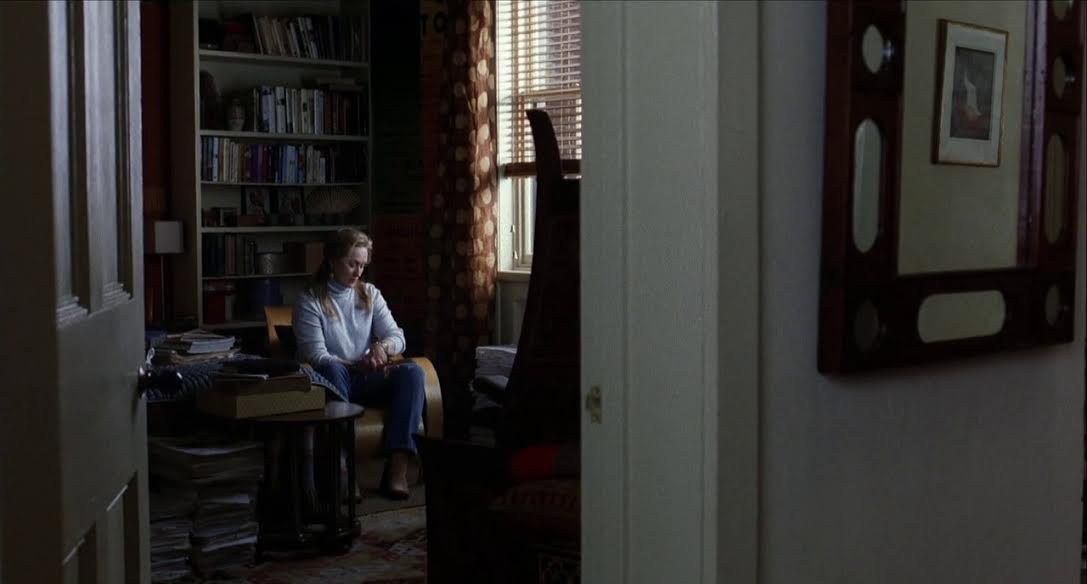
Streep is more understated but just as evocative in her scenes with Sally, as well as the exchange with her daughter Julia (Claire Danes) that follows her kitchen breakdown. I love that Streep refuses to sentimentalize her relationships with either Sally or Julia, which, in turn, asks some interestingly unresolved questions about these peripheral characters, whose psychologies, briefly explored in Cunningham’s work, are entirely extracted here: What secrets is Sally hiding from Clarissa? And what do she and Julia really think about so clearly occupying a lower rung than Richard in her mother’s heart and mind? The emotional distance that Streep maintains between Janney and Danes speaks volumes about Clarissa’s performances as partner and mother, her inability to monitor or accomodate the sensitivities of those closest to her. The cold, unforgiving eyes that Streep casts on Moore’s 50-years-older Laura in the film’s final moments aren’t so dissimilar from the detached way that Clarissa so often regards Sally, and if Julia ultimately breaks through to her mother, it’s only because the latter so eagerly needs an ear to confess to.
The rueful, unironic, and even giggling exuberance that underscores each of Streep’s words in her dialogue with Danes about Clarissa’s last moment of true and unadulterated happiness are a rare moment of clear-sighted self-awareness for the character. Yet the parts of Streep’s performance that hit the hardest are the non-verbal ones, the scenes and shots that could be watched on mute, without the added benefit of Glass’ plaintive score or Hare’s pointed writing, and still galvanize. Richard’s suicide is one of the eeriest horror scenes of the century, and Streep plays it as such, right down to the final close-up that finds her eyes widening and shutting with pale, blood-freezing terror as her reason for being vanishes before her. Just as indelible is the squint that breaks from Streep’s face when Moore, aged-up as Richard’s elderly mother, tells her, “You’re a lucky woman,” four unforeseen words that snap some instinct in Clarissa, forcing her to weigh all that has been lost in her life, as well as what remains. Every head-on frame of Streep throughout this discussion suggests an interiorized revelation that enables the film to conclude her character’s arc as it does, on a note of resilient acceptance and unexpected radiance as Clarissa, practically glowing in this second-to-last shot, shuts the lights in her well-appointed apartment and bids her ghosts a silent goodbye.
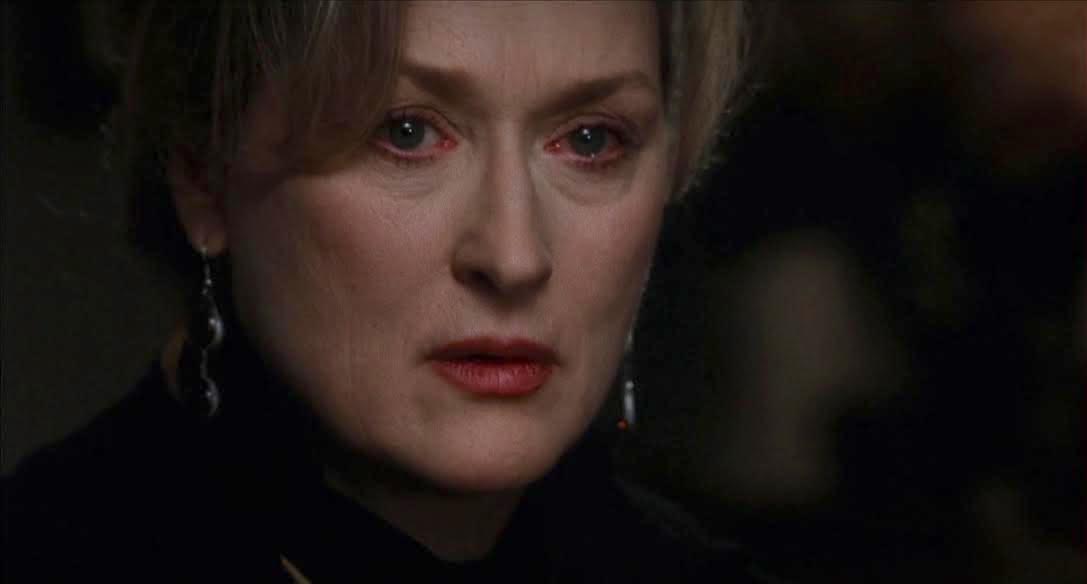
This moment never ceases to startle me, not least because every rattled gaze and stammered line of speech in the performance we have just witnessed has revealed the mounting hopelessness of a woman struggling to keep her life from collapsing. Strange, then, that Clarissa should end not as a sufferer but as a refortified survivor. It’s as if Daldry, Hare, and most of all Streep seem to say that no matter the hardship, Clarissa Vaughan will live to see another day.
This is a performance so full of performative grace notes that continually complicate our understanding of Clarissa, oftentimes within the span of single scene. What other choices of Streep’s do you find the most captivating and complex?
JOHN: As much as Streep’s performance is, as we’ve both discussed, a risky and nuanced feat of a woman’s utter unraveling, few scenes move me as much as the late-film confrontation between Mrs. Brown and Mrs. Dalloway, a scene in which Streep shares the screen with an actress of her caliber (a rare event!) and cedes it almost entirely to her.
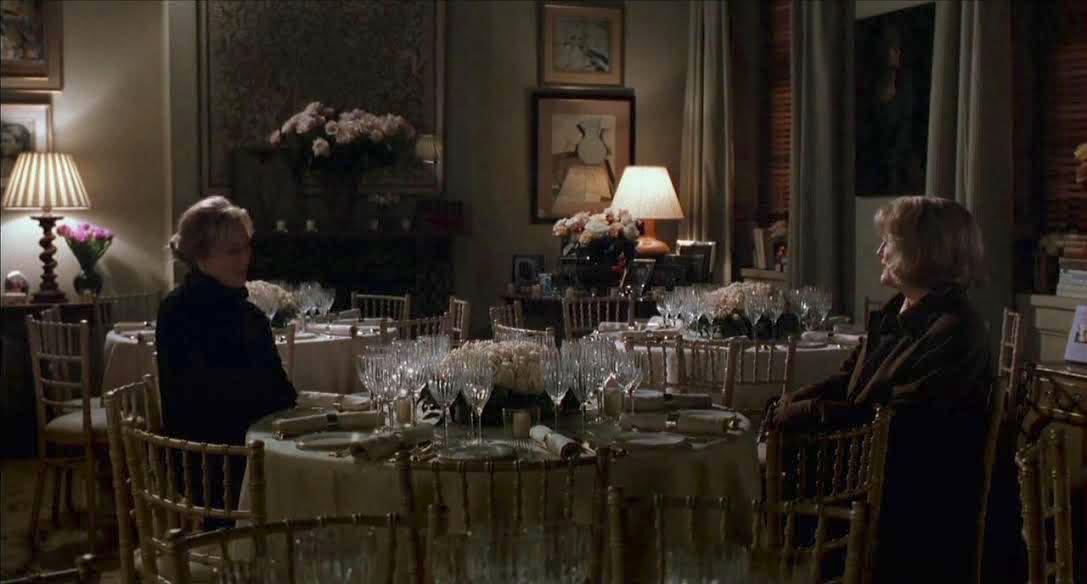
Laura Brown, convincingly aged and played as such by Moore, appears just hours after learning that the son she once abandoned has killed himself. Upon opening the door, Streep takes a few seconds to search this woman out, shocked and intrigued to finally match the real person to the stories Richard has regaled her with over the years. “You’re Laura Brown?” she asks, as if the woman she had pictured can’t possibly match her reality (“So that’s the monster,” Danes whispers to Janney), quickly takes her luggage and directs her toward an eerily empty dining room. Streep cautiously stands back, watching Moore soften the monstrous figure Richard has created, waiting for the horns to shoot out of her head.
Streep begins the scene as withdrawn and suspect as she could possibly be under the circumstances, but as Moore recounts her decision to abandon her children, Clarissa’s attempts to seal herself off are complicated by Laura’s sympathetic truth-telling. “You’re a lucky woman,” Laura tells Clarissa, who narrows her gaze, slightly confused and taken aback. Streep can barely make eye contact with Moore as she retells the story of her leaving her family and fleeing to Canada rather than kill herself. “What does it mean to regret when you have no choice?” Moore whispers. “It’s what you can bear… There it is. No one’s going to forgive me. It was death; I chose life.” Streep’s reaction, circumspect yet increasingly hypnotic, conveys the degree to which these words have stirred Clarissa by limiting all other faculties of her face yet keeping her eyes focused; this reserved expression is almost as unsettling as watching Clarissa grasp for the counter in her kitchen. When she later climbs atop her bed, lets down her hair, and kisses Sally, we can sense that this woman’s life has somehow set a new course.
By balancing remarkable physical control with emotional candor, Streep’s work in The Hours remains one of the most startlingly alive creations in her entire filmography.
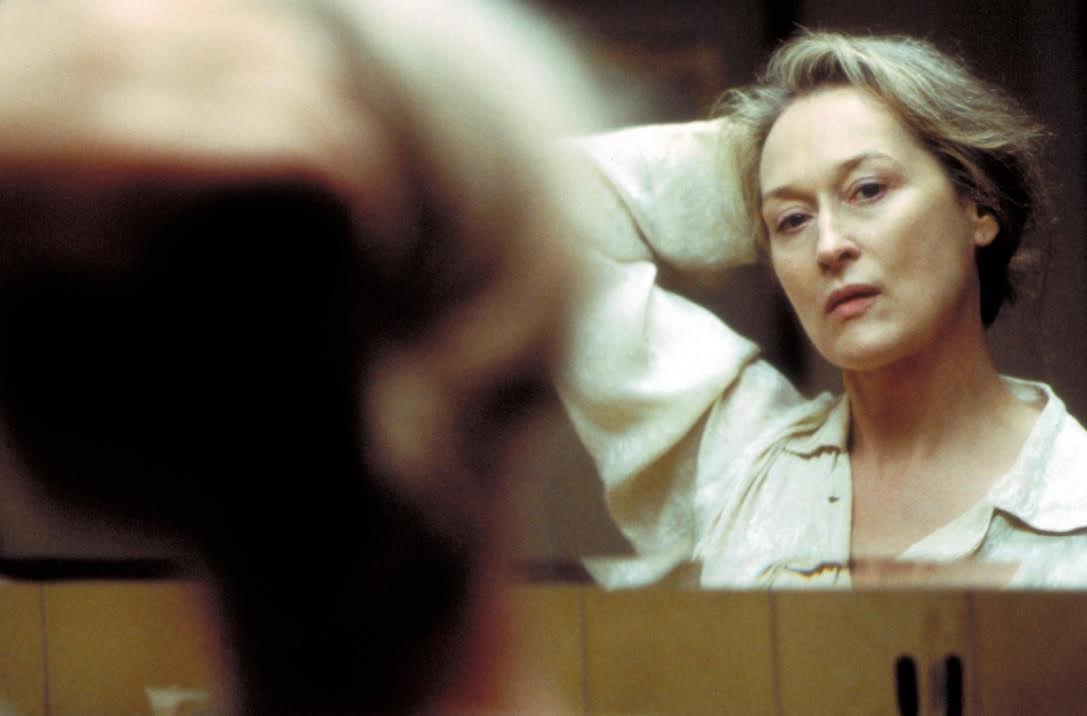
Catch up with 'Months of Meryl'
- Julia (1977)
- The Deer Hunter (1978)
- Manhattan (1979)
- The Seduction of Joe Tynan (1979)
- Kramer vs Kramer (1979)
- The French Lieutenant's Woman (1981)
- Still of the Night (1982)
- Sophie's Choice (1982)
- Silkwood (1983)
- Falling in Love (1984)
- Plenty (1985)
- Out of Africa (1985)
- Heartburn (1986)
- Ironweed (1987)
- A Cry in the Dark (1988)
- She-Devil (1989)
- Postcards from the Edge (1990)
- Defending Your Life (1991)
- Death Becomes Her (1992)
- The House of the Spirits (1993)
- The River Wild (1994)
- The Bridges of Madison County (1995)
- Before and After (1996)
- Marvin's Room (1996)
- Dancing at Lughnasa (1998)
- One True Thing (1998)
- Music of the Heart (1999)
- Adaptation (2002)